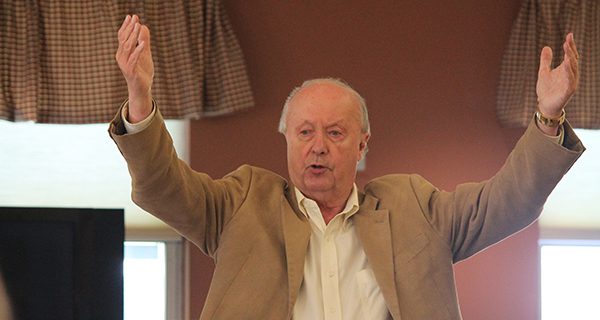[ccfic caption-text format="plaintext"]
By James Kinneen
Hometown Weekly Reporter
With younger generations of Americans both learning about socialism and filming themselves tampering with food by doing things like licking cartons of ice cream and putting them back on the shelves, what better time for Dr. Gary Hylander to address the Westwood Senior Center about Upton Sinclair’s “The Jungle”?
Hylander, a historian and professor of History at Stonehill College, hails from Illinois, which, he explained, played a role in his interest in the book about Chicago’s famed meatpacking industry during the early 20th century.
But while most people have a vague understanding that Sinclair showed the meat industry as being deeply unsanitary and in dire need of regulation, Hylander’s presentation added a lot more details to the narrative you may have learned in high school.
For starters, Hylander noted that Sinclair was an avowed socialist who came to fame at a time when books like “Principles of Scientific Management” were showing how the best business practices treated people as commodities and discarded the human element of labor. In the face of ideas like this, Hylander noted that “one of the villains of the story is capitalism. Sinclair points out that men like Rockefeller and Carnegie are not captains of Industry, they’re robber barons.”
But if you’re familiar with the book, it’s probably not because of its pro-socialism stance; it’s likely because of the tome’s vivid descriptions of the meatpacking industry. Hylander stood in front of the crowd with the book in hand and said, “The next time you have a sausage…”
He was immediately interrupted by a woman in the crowd loudly declaring: “I haven’t had one since I read that book!”
Dr. Hylander then read a passage describing the rats and dead bodies that would end up in the sausages. Yes, around the turn of the century, apparently when a dead body fell in the sausage maker, the individuals in charge simply told the man’s wife he never showed up to work, and probably ran away.
Meanwhile, he was in the sausage mix.
The descriptions in the book were so vivid that they led to Sinclair meeting Teddy Roosevelt, and Roosevelt creating the Pure Food and Drug Act. While you may have known that element, Hylander pointed out that Sinclair’s era coincided with the rise of canning and food in tin cans, but that “the brightest apple can be the most rotten inside - ask Cinderella.” Roosevelt was a soldier and watched the food inside these cans make his friends sick, with more people dying in the Spanish-American War from disease and food poisoning than combat, which likely played a role in his desire for safer food.
The ironic thing about Sinclair’s novel was that, according to Hylander, everybody was so disturbed at the passages describing the meat industry that they failed to read the last chapters in which Sinclair pushes his socialist agenda.
Hylander says the book doesn’t do well among young students because it is dense, nonlinear and requires paying very close attention. Still, over 100 years after its publication, the themes in the novel, ranging from socialism and food safety to the lives of American immigrants, are just as relevant as ever.





















